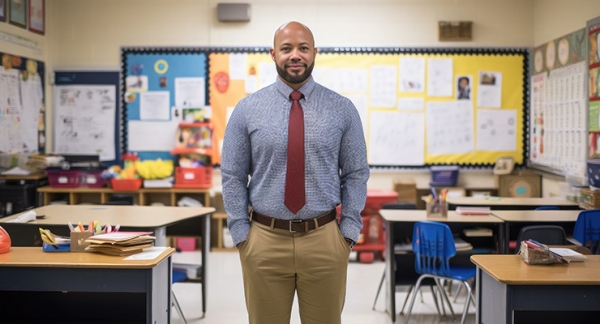How to start your new teaching job with confidence

So, you’ve secured a new teaching job, congratulations!
It won’t be long until you’ll be on the front lines of education, shaping the minds of our country’s future leaders and inspiring the upcoming generation. But before taking the big step into your new classroom, it can be difficult to know where to start and how to set yourself up for success as a teacher. Having confidence and believing in yourself is the key to achieving this.
The importance of teacher confidence
According to research, teachers' perceptions of their own teaching capabilities have an impact on how they approach and educate their students. By feeling confident in their abilities, they not only experience greater job satisfaction (Toropova et al. 2020) but are also more likely to act confidently. This means they are more willing to experiment with new ideas and techniques, as well as effectively managing unforeseen obstacles.
Exceptional teachers are not simply born, but rather, they evolve and develop over time. Teacher confidence progresses through improving skills and growing competence, both of which come with practice and experience in the field of teaching.
Fortunately, there are some simple steps you can take to make sure you’re off to the best possible start in your new teaching role. Through our years of experience and knowledge, we’ve put together five ways you can build your confidence and hit the ground running in your first week of school.
1. Get to know your students
Your students should be your top priority from day one. Take time during the first week to get to know their names, interests, learning styles and even the things that motivate them. This will help create an atmosphere of trust and mutual respect in your classroom right away. Even if you don't have time for one-on-one conversations with each student, make sure they feel heard by asking them questions about themselves and what they like to do.
2. Plan and prepare
The saying "Fail to plan, prepare to fail" holds a great deal of truth when it comes to teaching. Adequate planning is crucial for successful outcomes in the classroom.
When feeling anxious, it is important to allocate sufficient time for preparation and avoid rush work. However, you should strive to maintain a balance and not create an overly rigid plan. Incorporating a degree of flexibility will enable you to avoid panicking if unforeseen changes occur mid-way through.
Always have a clear idea of what you want your pupils to learn and how you want them to get there, the activities, resources/equipment and procedures will give you greater confidence and focus. Make sure you stay up to date with the latest curriculum, news and trends so that you remain at the forefront of your teaching profession.
If you’re an Early Career Teacher, check out these first year advice and planning tips which will help you get the most out of your induction years.
3.Your classroom, your rules
It's important to establish clear expectations for behaviour right away — let them know what type of conduct is acceptable (and unacceptable!) in your classroom and why it matters so much. Don’t assume that once a lesson starts and the pupils are sat in their seats, they are paying attention.
Calmly and confidently demand the behaviour you expect of them both inside and even outside the classroom. This sends a strong message that you expect respect, and in return, treat your students with respect.
4. Gather Resources for your classroom
A well-stocked classroom library is essential for any successful teacher — after all, books really do open doors! Make sure that at least some shelves in your room are filled with quality resources that support both content area knowledge and life skills such as problem solving or critical thinking. If there aren't enough books available within your budget constraints, don't forget about online resources that can supplement instruction in a fun and interactive way!
5. Make connections and buddy up
Parents and guardians play an important role in their children's education — make sure they know who you are right away! Reach out via email or phone call (if possible) during the first week of school and let them know who you are and what you'll be teaching this year. If you're able to connect with parents or guardians face-to-face, all the better! Meeting with parents will give them peace of mind that their child is in good hands with you as their teacher. Plus, it gives them an opportunity to ask any questions or voice any concerns they may have about their child's academic journey.
Gaining confidence does not solely come from teaching alone, but also from learning through teaching experiences. Doing this together with a more experienced teacher can boost confidence building. Having a teacher buddy within the school can help you learn from their experiences, share knowledge and ideas as well as provide essential support when you need it.
Starting a new teaching job can be intimidating but there are many ways teachers can ensure they have a successful start - from getting to know their students better, introducing themselves to parents and guardians, reflecting on the curriculum being taught and gathering resources for their classrooms - these tips will help any teacher transition into a new job confidently and effectively!






